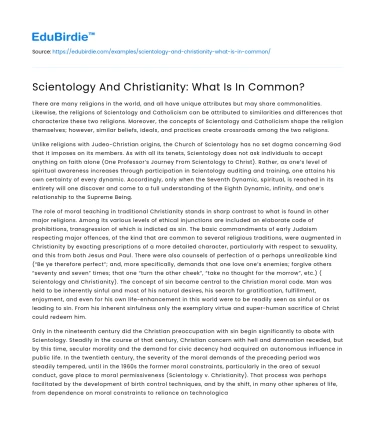There are many religions in the world, and all have unique attributes but may share commonalities. Likewise, the religions of Scientology and Catholicism can be attributed to similarities and differences that characterize these two religions. Moreover, the concepts of Scientology and Catholicism shape the religion themselves; however, similar beliefs, ideals, and practices create crossroads among the two religions.
Unlike religions with Judeo-Christian origins, the Church of Scientology has no set dogma concerning God that it imposes on its members. As with all its tenets, Scientology does not ask individuals to accept anything on faith alone (One Professor’s Journey From Scientology to Christ). Rather, as one’s level of spiritual awareness increases through participation in Scientology auditing and training, one attains his own certainty of every dynamic. Accordingly, only when the Seventh Dynamic, spiritual, is reached in its entirety will one discover and come to a full understanding of the Eighth Dynamic, infinity, and one’s relationship to the Supreme Being.
Save your time!
We can take care of your essay
- Proper editing and formatting
- Free revision, title page, and bibliography
- Flexible prices and money-back guarantee
The role of moral teaching in traditional Christianity stands in sharp contrast to what is found in other major religions. Among its various levels of ethical injunctions are included an elaborate code of prohibitions, transgression of which is indicted as sin. The basic commandments of early Judaism respecting major offences, of the kind that are common to several religious traditions, were augmented in Christianity by exacting prescriptions of a more detailed character, particularly with respect to sexuality, and this from both Jesus and Paul. There were also counsels of perfection of a perhaps unrealizable kind (“Be ye therefore perfect”; and, more specifically, demands that one love one’s enemies; forgive others “seventy and seven” times; that one “turn the other cheek”, “take no thought for the morrow”, etc.) (Scientology and Christianity). The concept of sin became central to the Christian moral code. Man was held to be inherently sinful and most of his natural desires, his search for gratification, fulfillment, enjoyment, and even for his own life-enhancement in this world were to be readily seen as sinful or as leading to sin. From his inherent sinfulness only the exemplary virtue and super-human sacrifice of Christ could redeem him.
Only in the nineteenth century did the Christian preoccupation with sin begin significantly to abate with Scientology. Steadily in the course of that century, Christian concern with hell and damnation receded, but by this time, secular morality and the demand for civic decency had acquired an autonomous influence in public life. In the twentieth century, the severity of the moral demands of the preceding period was steadily tempered, until in the 1960s the former moral constraints, particularly in the area of sexual conduct, gave place to moral permissiveness (Scientology v. Christianity). That process was perhaps facilitated by the development of birth control techniques, and by the shift, in many other spheres of life, from dependence on moral constraints to reliance on technological controls. Thus it is evident that the postulated model of the relationship between religion and morality is one that has been far from constant, even in the case of Christianity. Nor does this measure of variability arise only with changes that take place over time. It may also be exemplified among contemporaneous denominations. The moral attitudes found among present-day evangelicals continue to manifest a strong concern with personal sin in many areas of conduct, but the very idea of sin has come to be regarded almost as outmoded by many liberal churchmen, many of whom indict the deficiencies of the social system as responsible for the errant behaviour of individuals. Some of these liberal churchmen reject entirely the claims of an absolute moral code, preferring to commit themselves to situation ethics, the implications of which must often conflict radically with the received traditional Christian moral precepts (What is Scientology). Another, quite different, orientation is to be met with in Christian Science, in which sin is regarded merely as error proceeding from a false apprehension of reality, and which, together with sickness, may be eliminated, so Christian Scientists believe, by a change from material to spiritual ways of thinking.
Given this diversity of conceptions of sin within contemporary Christianity and the very varied moral dispositions to be found there, it is clearly inappropriate to expect to find mirrored in new religions moral injunctions supposedly similar to those of Christian churches. Scientologists have come into being in an epoch very different from that in which Christian denominations emerged and were formed. Society itself is radically different, and its social, economic, and above all the technological environment is subject to profound and accelerating change. What people know, what they want, and the realm of their personal responsibilities are of fundamentally different type and on a different scale from the norm of past centuries. New religions, if they are to attract the following that they do attract, must inevitably fail to conform to traditional stereotypes. That does not make Scientologist any less religious; however, both are valid beliefs systems with a large following.






 Stuck on your essay?
Stuck on your essay?

